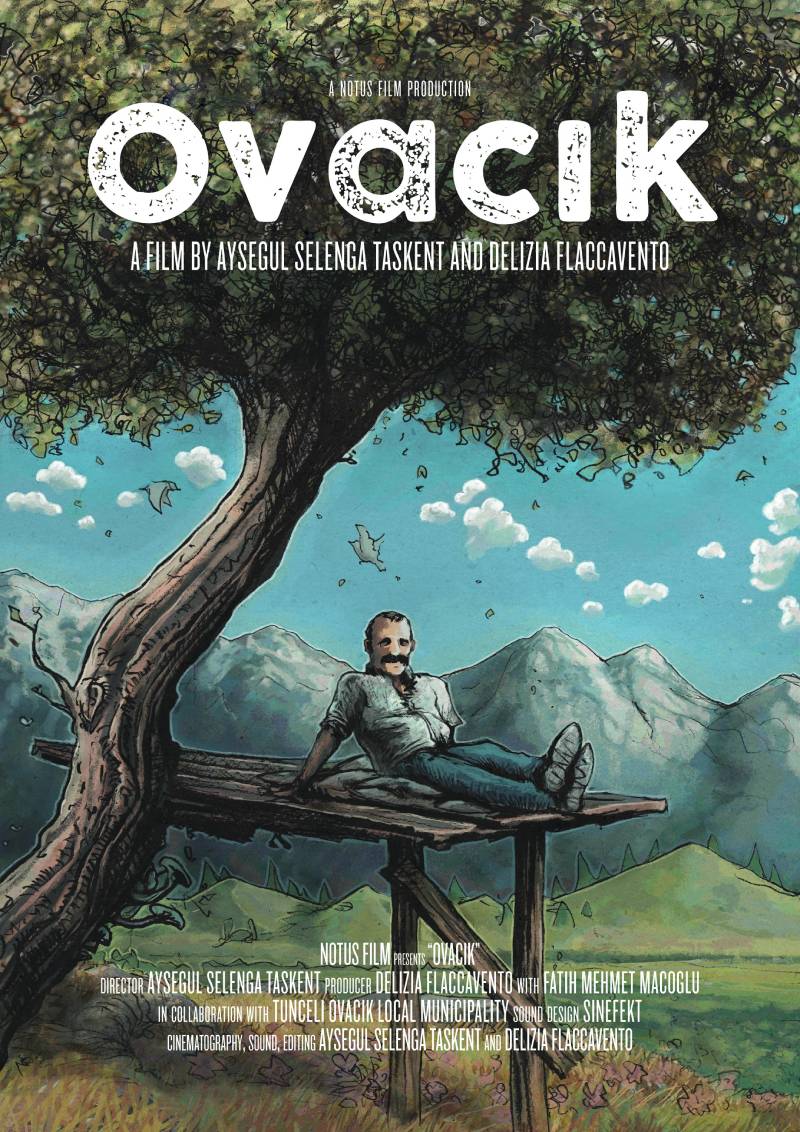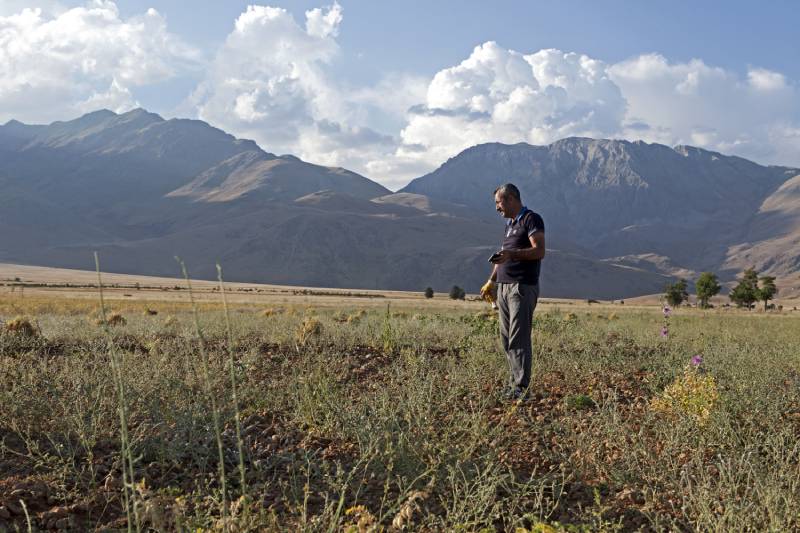Festivali BIFED: Interview: Aysegul Selenga Taskent & Delizia Flaccavento
Ovacik: messages of peace, love,
humanity and hope – all in one film
 Ovacik, an amazing film (Turkey, WP) - the jury’s 2nd prize winner - on an extraordinary character, mayor of Ovacik and its dedicated community, screened at BIFED as a world premiere. Fatih Mehmet Macoglu is the first mayor ever in Turkey elected by the Turkish Communist Party, as the mayor of Ovacik, a small Kurdish-Alevi town in the heart of Eastern Turkey, a place where cultural and humanistic values dominate to the benefit of all and not the few. Fatih Macoglu, “Turkey’s only communist Mayor”, as he is usually referred to, is known for destroying the walls around his office, because he wants to boost transparency, for refusing to drive his official car, for promoting organic agriculture and free public transport – from organic honey and chickpeas sales, he provides scholarships for University education to poor families, for posting a banner on his spending outside the office building for everyone to see etc. – these are just some of his accomplishments. In spontaneous cinema verité scenes, without construction, the film follows the daily life of Ovacik and Macoglu’s efforts to strengthen a sustainable economy by promoting community-based agriculture. By displaying refreshingly innovative and humane scenes of community work, where production and education are pursued with almost no budget, the film transmits a universal message of peace, love, solidarity of humans among themselves and with the planet, a message that benefits all, not only the few, setting the example for not only Turkey but the whole world. Every, especially observational, documentary experience is very personal, but this film is quite openly self-reflexive, showing the filmmakers as involved as possible in this unique experience. I talk to Aysegul Selenga Taskent, film director and Delizia Flaccavento, producer, about what both the historical reality and this film process mean to them, to Turkey, Europe…and the planet and what are its implications.
Ovacik, an amazing film (Turkey, WP) - the jury’s 2nd prize winner - on an extraordinary character, mayor of Ovacik and its dedicated community, screened at BIFED as a world premiere. Fatih Mehmet Macoglu is the first mayor ever in Turkey elected by the Turkish Communist Party, as the mayor of Ovacik, a small Kurdish-Alevi town in the heart of Eastern Turkey, a place where cultural and humanistic values dominate to the benefit of all and not the few. Fatih Macoglu, “Turkey’s only communist Mayor”, as he is usually referred to, is known for destroying the walls around his office, because he wants to boost transparency, for refusing to drive his official car, for promoting organic agriculture and free public transport – from organic honey and chickpeas sales, he provides scholarships for University education to poor families, for posting a banner on his spending outside the office building for everyone to see etc. – these are just some of his accomplishments. In spontaneous cinema verité scenes, without construction, the film follows the daily life of Ovacik and Macoglu’s efforts to strengthen a sustainable economy by promoting community-based agriculture. By displaying refreshingly innovative and humane scenes of community work, where production and education are pursued with almost no budget, the film transmits a universal message of peace, love, solidarity of humans among themselves and with the planet, a message that benefits all, not only the few, setting the example for not only Turkey but the whole world. Every, especially observational, documentary experience is very personal, but this film is quite openly self-reflexive, showing the filmmakers as involved as possible in this unique experience. I talk to Aysegul Selenga Taskent, film director and Delizia Flaccavento, producer, about what both the historical reality and this film process mean to them, to Turkey, Europe…and the planet and what are its implications.
Aysegul Selenga Taskent
Born in Ankara, Turkey, Aysegul Selenga Taskent earned her BA degree in American Literature. Her passion and interest for art and cinema started at an early age and after college pushed her to pursue filmmaking abroad. She received MA degree in Media Studies in England. In 2007, with a full scholarship, she earned an MFA degree in Media Arts Production at SUNY, Buffalo, USA. Her first documentary Volga, Volga: Living with Schizophrenia (2008) was screened in international festivals and won the Jury Prize in the 19th Ankara International Film Festival. Her second documentary Girls of Hope (2012) received the 2012 Rome Independent Film Festival Honorable Mention Award. In her works, Aysegul Selenga’s art focuses on social issues, human rights, love and peace. Through her work, she hopes to contribute to make the world a better place
Director’s filmography
Volga Volga: Living with Schizophrenia (2008)
Girls of Hope (2012)
Ovacik (2019)
Delizia Flaccavento
Delizia Flaccavento is a documentary photographer and photojournalist, whose work focuses on social issues and ethnic minorities. After graduating in Philosophy in her native Italy, Delizia studied Photojournalism in England, where she attended the National Council for the Training of Journalists (NCTJ) Press Photography program, and in the USA, where she earned a Master’s Degree from the School of Visual Communication, Scripps College of Communication, at Ohio University.
Delizia’s projects have been published and exhibited internationally. Her work on ethnic minorities includes projects on the Italian Americans, on the Italian Australians and on the Meskhetian Turks. In Turkey, among other things, she has documented the Iraqi refugees stranded in Istanbul, the refugees trying to reach the Greek islands from the Turkish coasts, the Istanbul Leprosy Hospital and the growing of disabled sport.
Delizia has co-produced the award winning feature documentaries Volga Volga: Living with Schizophrenia, Girls of Hope and Ovacik by director Ayşegül Selenga Taşkent, with whom she has co-founded the production company Notus Film.
Camera Lucida: Prior to making your film, what did the figure of Fatih Macoglu represent for you?
Aysegul Selenga Taskent: We heard that a guy from the communist party was elected and we wanted to go check all that he does for the community.
Delizia Flaccavento: Aysegul told me about Mr. Macoglu and showed me some videos of him and of the free bus in Ovacik, she told me we should go and check for ourselves because there might be a great film there and all I could say is “let’s go!”
Camera Lucida: This was the world premiere of your film Ovacik and you had standing ovation, plus an award from the international competition jury. How did you feel, to have the film screened in your local milieu? Did you expect this audience success?
Aysegul Selenga Taskent: The story of the first ever communist mayor and the community who elected him, as we witnessed so many stories while filming, the story of production, love and labor came so interesting to us and I thought it would resonate with the public, especially because not many cinema vérité stories are produced in Turkey. Also, it truly is a story of hope through production. But the standing ovation and so much interest surprised me a great deal. I was honored.
Delizia Flaccavento: All the people we mentioned the film to while working on it were genuinely interested, and as we built the story, Aysegul and I kept telling each other that really this film needs to be watched by as many people as possible. However, the reaction of the public is always a question mark.
In Bozcaada it was beautiful to see people laugh and cry exactly where Aysegul and I laughed and cried during the editing and to realize that our message had been delivered to the audience. What was even more interesting to me was that, in the days following the screening, people in the streets kept stopping us to tell us how much they enjoyed the film and how they felt a renewed energy and a will to reinvent themselves after watching the story of Ovacik.
Camera Lucida: What was crucial in deciding to make this project happen?
Aysegul Selenga Taskent: We started with the main media coverage but, since we are cinema vérité makers, we knew that we would not just go to Ovacik for a week and prepare a journalistic piece, we knew that we’d film on and off for at least a year. That’s the foundation of ethnographic filmmaking.
Delizia Flaccavento: What drove Aysegul to the mayor, I believe, is that she immediately understood that, beyond what the media were showing, there was a deeper story to follow and that was crucial in deciding to work on the project.
Camera Lucida: What was the initial response from the Mayor Fatih Macoglu and Ovacik community?
Aysegul Selenga Taskent: They thought we were one of the media crews who were visiting them for a day. A few travels and working relentlessly in the fields to harvest later, especially when they saw that we also went there under harsh winter conditions, they trusted us and understood that we were there for their story, not just for a commercial journalism piece.
Delizia Flaccavento: For the Mayor and for the locals, in the beginning we were two bourgeois women trying to make yet another reportage on them. As Aysegul said, when they saw that we kept going over and over again and that we managed to reach Ovacik even in the middle of a snowstorm, they started respecting us and considering us as hardworking as they are. The community welcomed us from the beginning, but became more supportive as they realised that we were not there to do something quick and move on to something else: we were there to stay and to make the best story we could possibly make on them.

Camera Lucida: How many people/audience do you think have actually heard of the Mayor of Ovacik, outside Turkey?
Aysegul Selenga Taskent: Not many, I guess. Some alternative European news agencies released news on him, but that’s it. I know that a French news channel did a short documentary on his Tunceli election campaign.
Delizia Flaccavento: I am Italian and in Italy, for example, nobody has heard of the Mayor of Ovacik, nor of the beautiful Munzur Valley, for what matters.
Camera Lucida: Neither in Montenegro, I am afraid. How did the two of you meet?
Aysegul Selenga Taskent: 20 years ago in a photography dark room while studying in the UK (smiles). We knew right away that we have the same sensitivity for the same causes and we would make a great production partnership.
Delizia Flaccavento: Our first collaboration was Aysegul’s MA thesis, a short documentary on German Turks: she just said she was going to Germany to film and asked if I would like to join her and that was the beginning of a beautiful friendship, to paraphrase Casablanca (smiles).
Camera Lucida: Delizia, you are an Italian living in Turkey and you excelled with your Turkish language at the film screening. How easy/hard was it for you to learn Turkish language? Who/what helped you most?
Delizia Flaccavento: My Turkish is very elementary and with a very strong accent, Turks just appreciate the effort I put in speaking, even if sometimes they don’t understand what I am saying (smiles). Turkish is a very difficult language and for someone coming from Latin based languages it is impossible to guess any words, since most words in Turkish come from Persian or Arabic, so it is a never ending challenge, but what helps me the most is that I do want to communicate, so I am trying my best, despite having very little talent for foreign languages and despite having never had the time to take a Turkish class. And Aysegul has been invaluable in teaching me idiomatic sentences that no foreigner learning Turkish only from books would ever know.
Camera Lucida: Have the Mayor and Ovacik people seen the film?
Aysegul Selenga Taskent: Not yet. This summer. Mayor’s daughter saw the film, though.
Delizia Flaccavento: She loved it, she felt her father in the film is exactly her father in daily life.



